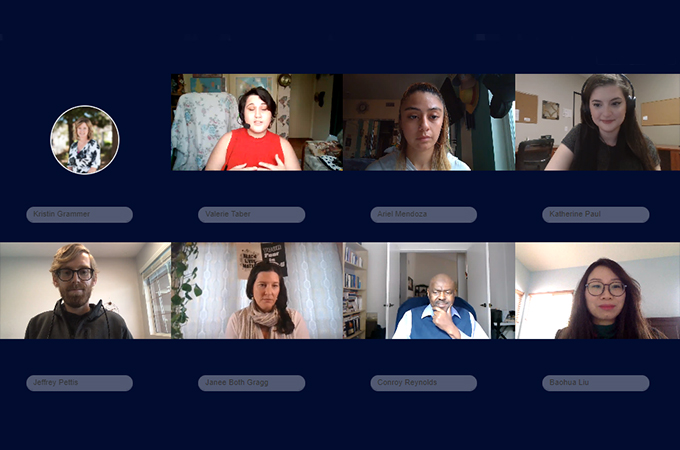The COVID-19 pandemic has changed the way we interact with each other and the world—from learning, teaching, and working to dining and entertainment. Realizing the challenges that a public health crisis posed for counseling students, the University of Redlands School of Education recently retooled two fieldwork fairs, both of which would have been in person under normal circumstances, to provide students with tools to launch their careers.
During the past year, the majority of counselors have transitioned to offering their services via telehealth platforms—online, legally compliant, secure environments that enable clients to access their healthcare providers virtually. This change in service delivery had consequences for students training to become clinical mental health and school counselors. Instead of completing their fieldwork training in person, they were required to transition to a digital environment.
As a result of this transition, the School of Education Office of Student Success and the Department of Counseling and Human Services hosted two virtual fairs in the early months of 2021—one for Clinical Mental Health Counseling students and another for School Counseling students—encouraging them to explore fieldwork options and learn more about career opportunities.
In order to gain real-world experience and further develop their counseling skills, students in both programs are required to spend time working at a third-party organization. During the virtual fairs, students interacted with community partners, including healthcare providers and local school districts, in order to determine where they would like to fulfill their fieldwork requirements.
“Entering the school year, we didn't know what these events would look like,” says Office of Student Success Assistant Director of Academic Advising Kristin Grammer. “We knew that we needed to go deeper—beyond just allowing students to meet counselors. We thought about how we could help them transition into the field of counseling. These events were geared toward career readiness in order to support their professional transition.”
During the events, Grammer notes there was engagement on all levels—among departments, partners, faculty members, alumni, and students. Students were able to ask alumni about how COVID-19 has impacted the services they provide. Clinical Mental Health Counseling Program Coordinator Janee Both-Gragg hosted a conversation with a panel of alumni and School Counseling Program Coordinator Tamara Tribitt spoke with a number of counseling professionals.
During the Clinical Mental Health Counseling Fair, Professor and Director of Online Programs Conroy Reynolds facilitated a conversation with clinical partners so that students could gain a better understanding of the participating organizations.
“Programs like ours are on the front lines of helping train practitioners to address the mental health crisis,” Reynolds said during the School Counseling event.” The Department of Counseling and Human Services is proud to house programs turning out graduates to fill this critical need. Our graduates are scattered across the state and beyond. They are fulfilling their passion for contributing to the wellbeing of our students—that includes the marginalized and those who have been victims of systemic injustices.”
In the context of the COVID-19 pandemic, hosting these virtual fairs became more important than ever. Grammer notes that the School of Education’s counseling programs have seen an uptick in the number of applicants, responding to the recognition of mental health needs at school and at home.
“The pandemic gave us a way to offer new avenues of participation,” she says, noting that the fairs will likely continue to be hosted virtually. “The online format allowed people from across the region to participate in ways that they couldn't have before.”
Even with the fairs’ change in modality, Naslund Endowed Dean Mario Martinez reaffirmed that the School of Education’s mission remains: “We are a justice-centered organization—that’s who our students, staff, and faculty members are. Our students and partners are the hands and feet that help us carry out the vision and mission that we so strongly believe.”
Learn more about the School of Education and the Office of Student Success.






